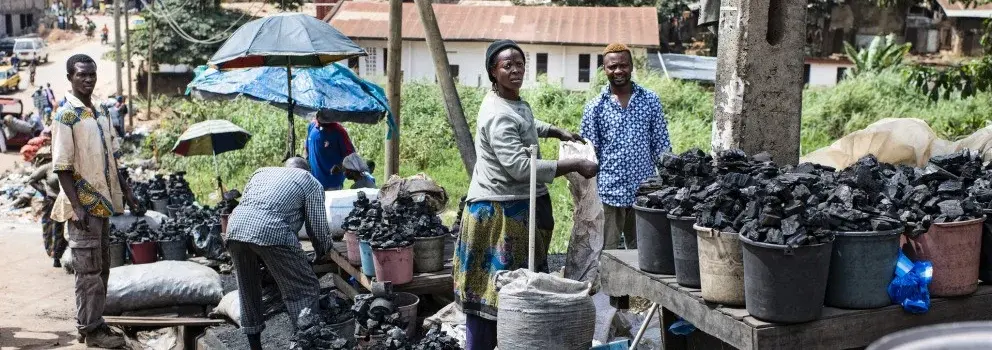Investigating the Systemic Impacts of the Global Energy Transition (ISIGET)

Project Description
The international energy transition is already delivering numerous benefits, but it is also creating new inequalities. The risks posed by this transformation will impact especially on developing countries, which lack access to technologies and capital. What, then, can be done to ensure that these countries can also make the transition to a low-carbon economy? The ISIGET project aims at developing recommendations for equitable forms of governance to reconcile conflicting policy goals.
ISIGET belongs to the research group 'Investigating the Systemic Impacts of the Global Energy Transition' at the IASS Potsdam.
People
-
Franz Haniel Professor for Public Policy (Willy Brandt School of Public Policy)
-
Output
Publications
- Apergi, M., Liliestam, J., Weko, S. & Zimmermann, E. (2023). Is renewable energy technology trade more or less conflictive than other trade?. Energy Policy. 177:113538.
- Goldthau, A., Apergi, M., Hermann, J., Eicke, L., Kurniawan, J., Schuch, E. & Weko, S. (2022). Fostering a Sustainable and Secure Energy Supply for Kenya. IASS Policy Brief. Retrieved from: https://publications.iass-potsdam.de/pubman/faces/ViewItemOverviewPage.jsp?itemId=item_6002588.
- Goldthau, A., Apergi, M., Hermann, J., Eicke, L. & Kurniawan, J. (2022). Unlocking a Low-Carbon Future for Malaysia. IASS Policy Brief. Retrieved from: https://publications.iass-potsdam.de/pubman/faces/ViewItemOverviewPage.jsp?itemId=item_6002463.
- Goldthau, A., Neuhoff, K., Weber, I., & Szulecki, K. (2022). How to design EU-level contingency plans for gas shortages? Evidence from behavioural economics, policy research and past experience. In DIW Berlin. Retrieved from: https://www.econstor.eu/handle/10419/253650.
- Goldthau, A., Weko, S., Hermann, J., Apergi, M., Eicke, L., Kurniawan, J. & Schuch, E. (2022). Accelerating the Jordanian Energy Transition. IASS Policy Brief. Retrieved from: https://publications.iass-potsdam.de/pubman/faces/ViewItemOverviewPage.jsp?itemId=item_6002583.
- Goldthau, A. (2021). A Marshall Plan for the Clean-Energy Transition. GMF Policy Brief. Retrieved from: https://www.gmfus.org/news/marshall-plan-clean-energy-transition.
- Weko, S., Eicke, L., Quitzow, R., Bersalli, G., Lira, F., Marian, A., Süsser, D., Thapar, S., & Xue, B. (2020). Covid-19 and Carbon Lock-In. Impacts on the Energy transition. IASS Study, June 2020.
- Kuzemko, C., Bradshaw, M., Bridge, G., Goldthau, A., Jewell, J., Overland, I., Scholten, D., van de Graaf, T., & Westphal, K. (2020). Covid-19 and the Politics of Sustainable Energy Transitions. Energy Research and Social Science, 101685. doi:10.1016/j.erss.2020.101685 .
- Bazilian, M., Bradshaw, M., Gabriel, J., Goldthau, A., & Westphal, K. (2020). Four scenarios of the energy transition. Drivers, consequences, and implications for geopolitics. Wiley Interdisciplinary Reviews - Climate Change, 11(2): e625. doi:10.1002/wcc.625 .
- Sovacool, B. K., Bergman, N., Hopkins, D., Jenkins, K. E., Hielscher, S., Goldthau, A., & Brossmann, B. (2020). Imagining sustainable energy and mobility transitions: Valence, temporality, and radicalism in 38 visions of a low-carbon future. Social studies of science. doi:10.1177/0306312720915283 .
- Goldthau, A., Richert, J., & Stetter, S. (2020). Leviathan Awakens. Gas Finds, Energy Governance, and the Emergence of the Eastern Mediterranean as a Geopolitical Region. The review of policy research. doi:10.1111/ropr.12387 .
- Goldthau, A., & Sitter, N. (2020). Power, authority and security. The EU’s Russian gas dilemma. Journal of European integration, 42(1), 111-127. doi:10.1080/07036337.2019.1708341 .
- Goldthau, A., & Hughes, L. (2020). Saudi on the Rhine? Explaining the emergence of private governance in the global oil market. Review of international political economy: RIPE. doi:10.1080/09692290.2020.1748683 .
- Eicke, L., & Petri, F. (2020). The EU in Global Energy Governance. In M. Knodt, & J. Kemmerzell (Eds.), Handbook of Energy Governance in Europe (pp. 1-26). Cham: Springer International Publishing.
- Goldthau, A., Eicke, L., & Weko, S. (2020). The Global Energy Transition and the Global South. In M. Hafner, & S. Tagliapietra (Eds.), The Geopolitics of the Global Energy Transition. Lecture Notes in Energy (pp. 319-339). Cham: Springer International Publishing.
- Weko, S. (2020). Weko: "Corona und Clean-Tech: Höchste Zeit für neue Strategien". Essen: energate.
- Goldthau, A., Eicke, L. & Weko, S. (2019): Countering the risk of an uneven low-carbon energy transition. IASS Policy Breif. Retrieved from: https://publications.iass-potsdam.de/pubman/item/item_4812898.
- Goldthau, A. (2019): Global Energy in Transition. How the EU Should Navigate New Realities and Risks. DGAP Policy Brief. Retrieved from: https://www.academia.edu/41825701/Global_Energy_in_Transition_How_the_EU_Should_Navigate_New_Realities_and_Risks.
- Goldthau, A., Quitzow, R., Thielges, S., Helgenberger, S. & Mbungu, G. (2019). Strengthening International Cooperation for a Global Energy Transition. IASS Policy Brief. Retrieved from: https://publications.iass-potsdam.de/rest/items/item_4072893_14/component/file_6000867/content
- Goldthau, A., Keim, M. & Westphal, K. (2018): The Geopolitics of Energy Transformation. Governing the Shift: Transformation Dividends, Systemic Risks and New Uncertainties. In SWP Comment. Retrieved from: https://www.academia.edu/38417174/The_Geopolitics_of_Energy_Transformation.
- Goldthau, A. & Belyi, A. V. (2015). Between a rock and a hard place: international market dynamics, domestic politics and Gazprom's strategy. Cadmus EUI. Retrieved from: https://cadmus.eui.eu/handle/1814/35398.
- Goldthau, A. & Sitter, N. (2015). Soft power with a hard edge: EU policy tools and energy security. Review of International Political Economy. Retrieved from: https://www.tandfonline.com/doi/epdf/10.1080/09692290.2015.1008547?needAccess=true&role=button
- Goldthau, A. (2015). Addressing the Russian Energy Challenge: Why Regulation Trumps Geopolitics. GMF Policy Brief. Retrieved from: https://www.belfercenter.org/publication/addressing-russian-energy-challenge-why-regulation-trumps-geopolitics.
- Goldthau, A. & Hoxtell, W. (2012a). Addressing Carbon Emissions and Oil Price Volatility. Challenges and Opportunities for Transatlantic Energy Cooperation. GPPi and Brookings Transatlantic Agenda Paper. Retrieved from: https://www.researchgate.net/publication/280609679_Addressing_Carbon_Emissions_and_Oil_Price_Volatility_Challenges_and_Opportunities_for_Transatlantic_Energy_Cooperation.
- Goldthau, A. & Hoxtell, W. (2012b). The Impact of Shale Gas on European Energy Security. GPPi Policy Paper. Retrieved from: https://pure.royalholloway.ac.uk/en/publications/the-impact-of-shale-gas-on-european-energy-security.
- Goldthau, A. (2010). Energy Security: The global challenges and how to meet them. Background Briefing Munich Security Conference.
- Goldthau, A., Keith, C., Toman, M., Light, T., Johnson, S., Nader, A., Rabasa, A. & Dogo, H. (2009). Does Imported Oil Threaten U.S. National Security? RAND Research Brief. Retrieved from: https://www.rand.org/pubs/research_briefs/RB9448.html.
- Goldthau, A. (2008). Energy efficiency in Russia. Russian Analytical Digest.
- Goldthau, A. (2007). Gasproduzenten rücken zusammen: Der GECF-Gipfel in Katar und die Erfolgsaussichten einer "Gas-OPEC". SWP Policy Brief. Retrieved from: Gasproduzenten rücken zusammen: Der GECF-Gipfel in Katar und die Erfolgsaussichten einer »Gas-OPEC« (econstor.eu)




